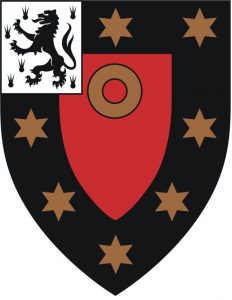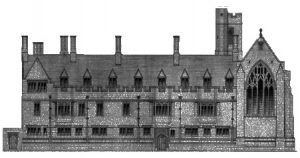
David is the founding Artistic Director of Vespri Segreti, a professional Oxford based vocal ensemble which exists to perform a wide range of early and contemporary repertoire. The members are all accomplished soloists and consort singers, with many performing with leading ensembles such as The Tallis Scholars, The Cardinall’s Musick, The Sixteen, and Ex Cathedra.
The group has performed in a number of venues throughout the UK for a range of events, including concerts, smaller scale recitals, conference performances, weddings, birthdays, and memorial services. We are flexible in number, depending on the occasion, and can present programmes with between 4-16 singers.
We are currently fundraising for our next programme, part of a longer term project to survey the works of recusant Catholic composer William Byrd (c. 1540-1623):
The Flower of Oxford
A musical account of the martyrdom of St Edmund Campion
Edmund Campion (1540-81), Jesuit priest and one of the so called ‘Forty Martyrs’, received his early education at Christ’s Hospital before being admitted to St John’s College, Oxford with a scholarship where, in 1557, he progressed to the role of Junior Fellow.
During his time at Oxford, due in no small part to his popularity and brilliance as scholar, he gained the patronage of the Earl of Leicester and William Cecil. He was chosen as orator for the visit of Elizabeth I to the University in 1556, and when Sir Thomas White, founder of St John’s, died in 1567 it fell to Campion to deliver the Latin funerary oration.
Although Campion was ordained an Anglican deacon in 1568, this did not sit well with his conscience, and in 1571, having travelled to the Continent, reconciled himself to the Catholic Church. In 1580 he passed back into England via London disguised as a jewel merchant, and went on to minister to the recusant community in Oxfordshire and surrounding counties. Campion was captured in the following year at Lyford Grange (now in Oxfordshire) and, after imprisonment and torture, was convicted of treason and martyred at Tyburn (near what is now London’s Marble Arch).
William Byrd, one of England’s finest musicians, and a known recusant who composed music for clandestine Catholic liturgies, reacted to the news of Campion’s death by composing the monumental quadripartite motet Deus venerunt gentes (‘O God, the Gentiles have come into thine inheritance’): it’s structure perhaps alluding to the barbaric act of quartering, inflicted on the martyr as the final act of his execution. Another of the ‘Forty Martyrs’ Henry Walpole (1558-95) was present at the execution and was moved to write the sixteen stanza poem ‘Why do I use my paper, ink and pen?’, of which Byrd set only three stanzas to music and publishing them in his ‘Psalmes, sonets & songs’ of 1588. In order to avoid courting trouble with the authorities, Byrd refrained from setting any of the more potentially seditious portions of the poem. Yet this was a bold move on his part and it is likely that anyone sympathetic to the Catholic cause would have been familiar with the complete text.
Byrd O Lord, make thy servant, Elizabeth
Byrd O gloriosa Domina
Byrd Credo from Mass for Four Voices
Chant Te Deum
Byrd Memento salutis auctor
Byrd Deus venerunt gentes
Byrd Why do I use my paper, ink and pen?
Byrd Agnus Dei from Mass for Four Voices
We will sing these works at the original printed (low) pitch, making it suitable for modern day male altos, tenors, baritones, and basses, and thus restoring a richness and depth to the music.We are fortunate in that all of our accomplished young singers are able to bring a wealth of experience, passion, and freshness to these highly expressive works.
Alto – Henry Kimber, William Waine
Tenor – Benjamin Durrant, Edward Woodhouse
Baritone – Michael Hickman, Patrick Keefe
Bass – Thomas Lowen, Christopher Webb
Director – David Bannister
Please visit, share, and donate here.
Music by composers associated with the English Chapel Royal, including Tallis, Byrd, Christopher Gibbons, and Purcell.
Tightrope
A programme of sacred works by William Byrd (c. 1540-1623), intended to place his Catholic music in the context of his Anglican output and loyalty to Elizabeth I.
The Tudor Succesion
Inspired by a painting by Lucas de Heere (1534–84), this programme presents music by composers associated with the Tudor court, including John Taverner (c. 1490–1545), Cristóbal de Morales (c. 1500–53), Philip van Wilder (c. 1500–54), and Thomas Tallis (c. 1505–85).
Do get in touch if you would like to consider booking us for your event.

David holds the post of Choir Director at St John’s College, Oxford.
Here he recruits and trains the accomplished student Choir, as well as directing them in Evensong services held twice a week in Chapel (Wednesday 6pm; Sunday 6pm) during university full term. The choir also records and tours, with a planned trip to Vienna during April 2020.
He is happy to hear from prospective singers at any point during the year.

David also holds the post of Master of the Music at Pusey House.
Here he recruits and directs the young professional octet which sings for the Solemn High Mass at 11am on Sundays during University Term.
When permanent vacancies arise, they are advertised here.
Enquiries from prospective singers who would like to join the deputies’ list are welcomed at any point in the year.

